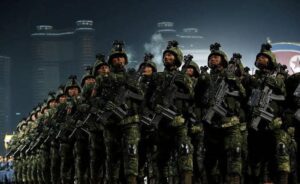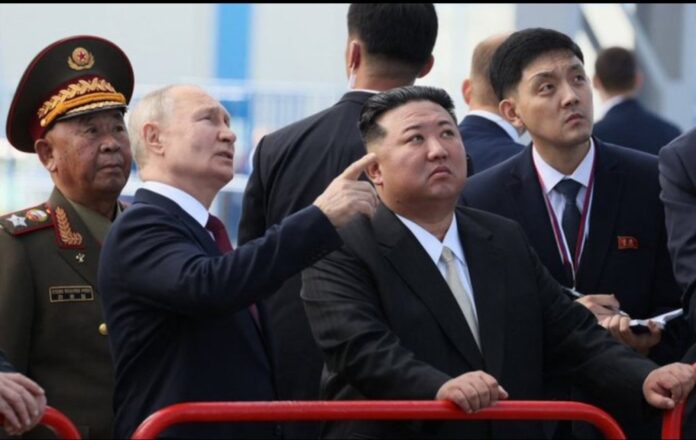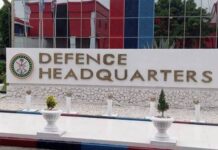North Korean Troops in Russia: A strategic move similar to 1971 India-Pakistan war?
The National Intelligence Service of the Republic of Korea has recently released satellite imagery that purportedly shows North Korean troops at military training facilities in Russia, specifically at the Sergeevka training ground in Primorsky Krai near Vladivostok and at a military facility in Khabarovsk.
The reports indicate that additional contingents from the Democratic People’s Republic of Korea (DPRK) are stationed at Blagoveshchensk. Before their deployment, these troops were allegedly trained in North Korea under the personal supervision of Kim Jong-un. The satellite images reportedly captured on October 16 depict around 400 North Korean soldiers on the parade ground in Ussuriysk and approximately 240 during training exercises in Khabarovsk.
Though the images claim to show evidence of troop presence, critics note the lack of definitive proof, raising questions about the credibility of these assertions. Initially, around 1,500 North Korean special forces were transported to Russia, with reports suggesting a total deployment of approximately 12,000 soldiers being prepared for future assignments.
READ ALSO: Putin threatens to restart production of mid-range nuclear weapons

Strategic Implications of DPRK Troop Deployment
If these claims hold true, the implications of Russia’s strategic partnership with North Korea could be significant. Some analysts argue that the troops might be trained and equipped with Russian military gear, including uniforms and potentially fabricated identification, to facilitate their integration with Russian forces.
The situation in Ukraine has been characterized by a relatively subdued intensity in Russia’s military operations. Despite Western claims of an “all-out war” against Ukraine, Russia has deliberately refrained from fully deploying its military might, primarily to avoid provoking NATO into intervening directly.
Instead, Russia appears to be employing a strategy of deterrence, leveraging time and resources to achieve its military objectives without overextending its forces. The introduction of North Korean troops could provide a strategic reserve, allowing Russia to deploy more of its own troops to the front lines without compromising its overall military posture.
READ ALSO: Putin: Russia, North Korea will support each other if attacked, strengthening ties
Non-Combat Roles and Border Security
The potential deployment of North Korean troops may initially focus on non-combat roles, allowing Russia to maintain a higher number of troops along its extensive borders while reallocating more soldiers to the Ukrainian conflict. Russia’s land borders stretch over 22,000 kilometers, with threats from multiple fronts, including Ukraine, Finland, and Norway, as well as heightened tensions with the U.S. across the Bering Strait in Alaska.
Deploying DPRK forces across various military installations within Russia could free up Russian troops for combat duties while simultaneously ensuring that Russia remains vigilant against external threats.
Training Needs for Combat Readiness
To prepare DPRK troops for direct combat with Ukrainian and NATO forces, extensive training would be required. This training is expected to last over a year and would include familiarization with Russian military tactics, battlefield communication systems, terrain adaptation, and a basic understanding of the Russian language.
The speed at which Russia decides to deploy these troops will be critical. An expedited deployment could heighten tensions and escalate the conflict; however, the current military strategy appears to favour a more cautious approach.
Comparative Analysis with Historical Context
The relationship between Russia and North Korea shares parallels with the strategic partnership established between India and the Soviet Union during the 1971 Bangladesh Liberation War. That partnership was intended to deter potential interventions by China or the U.S. Similarly, the current strategic partnership between Russia and North Korea may serve as a countermeasure against NATO’s involvement in Ukraine.
While the situation continues to evolve, the integration of North Korean troops into Russian military operations could be a significant factor in shaping the future dynamics of the ongoing conflict in Ukraine. If successful, it may deter NATO’s potential escalation efforts and change the calculus of military engagements in the region.
Follow the Neptune Prime channel on WhatsApp: https://whatsapp.com/channel/0029Va74ZvU2v1IqKByXoX3d
Do you have breaking news, interview request, opinion, suggestion, or want your event covered? Email us at neptuneprime2233@gmail.com
Follow the Neptune Prime channel on WhatsApp:
Do you have breaking news, interview request, opinion, suggestion, or want your event covered? Email us at neptuneprime2233@gmail.com





